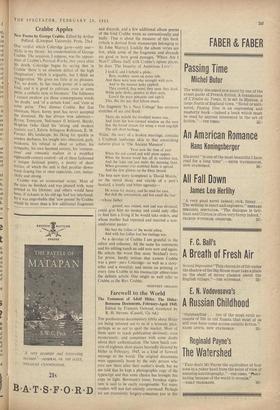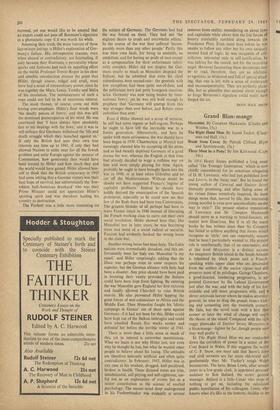Farewell to the World
The Testament of Adolf Hitler. The Hitler- Bormann Documents, February-April 1945. Edited by Francois Genoud, translated by R. H. Stevens. (Cassell, 12s. 6d.) THE posthumous documentary titbits about Hitler are being rationed out to us at a leisurely pace, perhaps so as not to spoil the market. Most of them seem to reach publication deviously, even mysteriously, and sometimes with some doubt about their authentication. The latest batch con- sists of eighteen short pieces hurriedly dictated by Hitler in February. 1945, as a kind of farewell message to the world. The original documents were apparently burnt by the only person who ever saw them after their author's death, but we are told that he kept a photographic copy of the typescript and that some chance has brought this copy to light. Bormann's loose, formless signa- ture is said to be easily recognisable. Yet many readers will not feel entirely convinced. Perhaps we are excessively forgery-conscious just at this
moment, yet one would like to be assured that an expert could not pass off Bormann's signature in a photostatic copy if it was worth his while.
Assuming their truth, the main interest of these last-minute jottings is Hitler's explanation of Ger- many's failure. His retrospective reasons, even when absurd or contradictory, are fascinating, if only because they illuminate a personality whose quirks and fantasies had such an appalling effect on the world. Professor Trevor-Roper in his clear and sensible introduction stresses the point that Hitler, though coarse, vulgar and cruel, must have had a mind of extraordinary power, since he was together the Marx, Lenin, Trotsky and Stalin of his revolution. The reminiscences of such a man could not fail to be of enormous interest.
The stock themes, of course, come out with boring over-emphasis. Hitler's final words were 'the deadly poison of Jewry,' and this was still the dominant preoccupation of his mind. He was convinced that '1 have always been absolutely fair in my dealings with the Jews,' and it was in self-defence that Germany withstood the 'life and death struggle which they launched against us.' If only the British had seen their own true interests any time up to 1941, if only they had allowed Nazism to settle once for all the Jewish problem and unite Europe against the menace of Communism, how generously they would have been treated by Hitler and how much they and the world would have gained. Hitler allowed him- self to think that the British aristocracy in 1945 had some inkling that a German victory was their best hope of survival, but unfortunately the 'Jew- ridden, half-American drunkard' who was their Prime Minister could not appreciate Hitler's sporting spirit and was therefore leading his country to destruction.
The Fuehrer was a little more interesting on the subject of Germany. The Germans had had the war forced on them. They had not 'the slightest desire to crush and overwhelm others.' In the course of the war they suffered 'incom- parably more than any other people.' Partly this was their own fault, for being so unstable, so credulous, and for having no pride of race except as a compensation for their unfortunate inferi- ority complex. Hitler did not despise the Ger- mans nearly as much as Mussolini despised the Italians, but he admitted that even his chief subordinates were second-rate: the generals with few exceptions had been quite out-of-date, and the politicians were just petty bourgeois reaction- aries. Germany was now being beaten by inter- national Jewry; yet he was still bold enough to prophesy that 'Germany will emerge from this war stronger than ever before, and Britain more enfeebled than ever.'
Even if Hitler showed not a scrap of remorse, he still had some regrets or half-regrets. Perhaps he ought to have left the inevitable war to a future generation. Alternatively, and here he spoke with more seriousness, the war should have been begun in 1938. Chamberlain at Munich had cunningly cheated him by accepting all his terms and so had meanly deprived Germany of a good excuse for war, whereas the English at that time had already decided to wage a ruthless war on him and were simply playing for time. Again, probably he ought to have brought Spain into the war in 1940, or at least taken Gibraltar and so cut off the Mediterranean. Without doubt he should not have supported Franco's 'regime of capitalist profiteers.' Instead he should have boldly decreed the emancipation of the Spanish proletariat, especially as he could now see that few of the Reds there had been true Communists. The greatest blunder of all perhaps had been to leave France intact in 1940 instead of liberating the French working class to carry out their own social revolution. Hitler showed here that, like Mussolini too in later years, he was becoming more and more of a social radical or socialist. Fascism had evidently backed the wrong horse in the class war.
Another wrong horse had been Italy. The Latin nations were irremediably decadent, and this un- fortunately went for Italy too. Mussolini 'is my equal,' said Hitler surprisingly, adding that the Duce was perhaps even in some respects his superior, but the German alliance with Italy had been a disaster. Any price should have been paid in boosting their vanity provided the Italians could have been kept from fighting. By entering the war Mussolini gave England her first victories and fatally allowed Churchill to raise British morale. He also prevented Hitler tapping the great forces of anti-colonialism in Africa and the Middle East. Then Mussolini fought his 'idiotic campaign in Greece' out of sheer spite against Germany; if it had not been for this, Hitler could have kept out of the Balkan imbroglio and could have attacked Russia five weeks sooner and defeated her before the terrible winter of 1941.
There is more than a little sense in much of this, yet its interest is somewhat meretricious. What we learn is not why Hitler lost, nor even why he thought he lost, but what he wanted other people to believe about his losing. The attitudes are therefore tediously artificial and often quite contradictory. In February. 1945, Hitler was in any case at his weakest, drugged, half-paralysed, broken in health. These dictated notes are trite, unsubstantial, self-pitying and self-righteous, use- ful not as an explanation of events but as a minor contribtition to the science of morbid psychology. The master-mind deep underground in his Fuehrerbunker was evidently at several removes from reality, meandering on about Jews and capitalists while above him the live forces of history irresistibly rumbled along towards the Potsdamer Platz. Even more than before he was unable to follow any other but his own uniquely twisted kind of logic; he was incapable of self- criticism, interested only in self-justification; he was talking for the record. not for the recording angel. However fascinating these documents may be to read, therefore, they are so nihilistic, so egotistic, so blinkered and full of special plead- ing, that one is left with a sense of irrelevance „. and inconsequentiality. They are perfectly plaus- ible, but so plausible that anyone clever enough to forge Bormann's signature could easily have forged the lot.
DENIS MACK SMITH







































 Previous page
Previous page